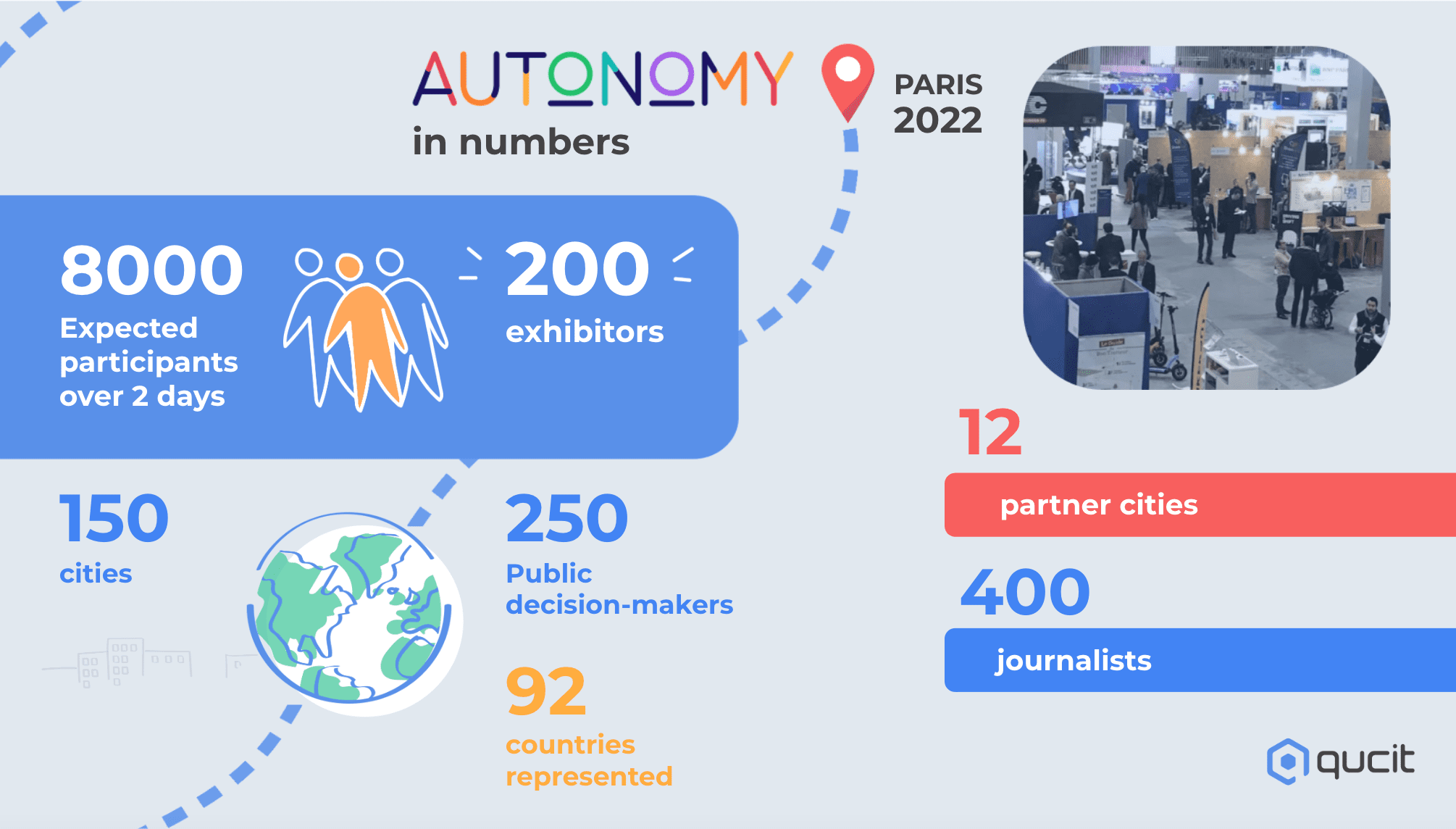Autonomy Paris, 2022 - world's leading mobility network
On March 16 and 17, Qucit had the opportunity to participate in the Autonomy trade show in Paris, Porte de Versailles. An excellent opportunity for the team to discover today's solutions and tomorrow's innovations in the field of sustainable mobility. Let's take a look back at these two days of trade fairs full of novelties!
What is the Autonomy exhibition?
Autonomy Paris, the pioneering trade fair for new mobility solutions, is considered to be one of the most important annual mobility gatherings in the world.
For Qucit, Autonomy was an opportunity to:
Detect the latest industry trends
Meet new partners
Attend expert conferences about sustainable mobility
What is the profile of the exhibitors?
Autonomy Paris presents the entire mobility value chain around eight sectoral themes:
Micro-mobility and active mobility
Shared mobility
MaaS, ticketing and payment solutions
Mobility services and solutions for the smart city
Corporate mobility and fleet management
Electric mobility and its infrastructures
Last mile urban logistics
Autonomous vehicles and associated technologies
What trends should we remember from Autonomy Paris?
Among the countless innovations discovered during the show, two trends caught our team's attention:
The democratisation of MaaS
More and more local authorities are setting up MaaS (Mobility as a Service) on their territory. This tool allows all transport options to be grouped together in a single application. It makes it easier for users to plan their journeys and encourages them to favor more environmentally friendly modes of transport, such as shared micro-mobility.
Want to know more about MaaS? Read our article on the subject!
The sustainable development of electric micro-mobility vehicles
Autonomy also highlighted the growing and sustained demand from cities for electric micro-mobility vehicles. Fully or partially electric systems are becoming increasingly common in urban areas.
For more details on self-service electric bikes, click here!
Qucit Bike at Autonomy: optimizing the management of micro-mobility fleets to improve the urban mobility offer
With such a strong focus on mobility, Autonomy Paris has become a not to be missed event for Qucit! A perfect opportunity for Qucit to present in detail the Qucit Bike software to the numerous visitors.
Qucit Bike helps operators of bike-sharing systems to optimize the management of their fleet. The software consists of two modules:
A dashboard, intended for the manager, helping him/her to visualize the status of the system in real time and to analyze all the operations carried out.
A mobile application, used by the dispatchers in the field, allowing them to carry out their daily tasks in an optimal way.
Check our website to find out more about Qucit Bike!
Located in the start-up area, Autonomy also offered Qucit the opportunity to reconnect with the urban innovation ecosystem, which includes many companies involved in sustainable mobility.
Shared mobility and public transport: a possible combination for all communities?
Autonomy Paris was also an opportunity for Qucit to take part in a number of high quality conferences. Among them, “Rethinking the daily life of urbanites by combining shared mobility and public transport” caught the team's attention.
Led by Florence Leveel (RATP Smart System), Etienne Chaufour (France Urbaine), Stephane Schultz (15marches), Augustin Boeuf (City of Le Havre) and Antoine Bluy (Lime), the conference focused on the integration of micromobility in the daily life of urban people.
How do cities view micromobility today?
The massive appearance of micro-mobility vehicles on French streets more than three years ago has allowed many local authorities to take the necessary step back from these offers in order to allow citizens to fully benefit from their advantages.
This is the case of the City of Le Havre, which has analysed all the mistakes linked to the anarchic implementation of these vehicles in other cities in order to avoid reproducing them. This detailed analysis enabled the city to integrate Lime electric scooters into its mobility offer after defining dedicated parking spaces and reducing the speed of vehicles in certain accident-prone areas. The scooter service was first introduced in the city centre, before being extended to the outskirts. In this way, Lime was able to establish itself for the first time in a town of 6,500 inhabitants, Octeville.
In this way, the cities' view of micro-mobility has changed in three years. Two realizations can be noted:
The non-extensibility of the public domain: it is no longer conceivable to nibble away at green spaces for mobility.
The sometimes caricatural development of micro-mobility: the majority of vehicles are often found in the heart of cities where the mobility offer is the most complete.
Today, this awareness has allowed micro-mobility to be seen as a complementary solution to existing mobility, which means that innovative schemes must be devised to offer this service to the outlying areas that need it most.
After three years of existence, what are the results for micro-mobility?
To sum up, in three years of existence, micro-mobility has evolved considerably:
It is no longer the prerogative of large cities, and many small and medium-sized communities are taking it up
The anarchic deployment of the first fleets has given way to a structuring of the operators' offer
More and more cities, and operators, are proposing alternative mobility offers in areas located on the outskirts of city centers.
See you at the next Autonomy Paris in March 2023!
In conclusion, the keen interest shown by the visitors and the abundant initiatives of the exhibitors demonstrate that local authorities and companies are uniting in a common direction: sustainable mobility!
—




